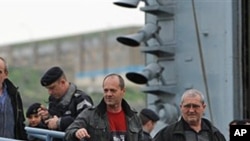The British government is defending its effort to make contact with rebel forces in eastern Libya following the capture and release of a group of British diplomats and elite special forces troops. The mission was intended to reach out to the anti-Gadhafi forces in Benghazi, but the rebels instructed the delegation to leave the country. The incident has highlighted the challenges facing the international community in responding to the uprising.
The British mission was aimed at making contact with rebel forces opposed to Libyan leader Moammar Gadhafi.
A helicopter reported to be carrying elite special forces soldiers and Foreign Office officials landed south of the eastern rebel stronghold of Benghazi on Friday.
But instead of welcoming them - opposition forces arrested and disarmed the group.
Rebels say they found weapons, maps and fake passports among the group's belongings.
Opposition spokesman Ghoga Al-Hafiz gave this response at a press conference.
He says, “Libya is an independent nation, therefore our sovereignty and our borders should be respected by everybody. We have no idea if they are here on a specific mission or if they are here for discussions with the National Council, but considering how they entered the country, we have refused to speak to them entirely.”
The delegation left Benghazi Sunday aboard the British warship HMS Cumberland, minus their weapons and helicopter. A recording claiming to be of the British ambassador pleading on the phone with rebels to release the group was played on Libyan state television.
Back in London, the media and political opposition figures are criticizing the government for its handling of the Libyan crisis.
On Monday the Foreign Secretary William Hague admitted he approved the mission.
“Last week I authorized the dispatch of a small British diplomatic team to eastern Libya in uncertain circumstances which we judged required their protection to build on these initial contacts and to assess the scope for closer diplomatic dialogue," said William Hague. "I pay tribute to that team. They were withdrawn yesterday after a serious misunderstanding about their role, leading to their temporary detention.”
Rebel forces have questioned why the British mission was so secretive - and why it did not just use the Benghazi port or airport.
Middle East analyst Barak Seener of the Royal United Services Institute says the confusion was inevitable.
“There was no other alternative," said Seener. "The problem that exists is that the Gadhafi regime is in charge of the communications and still has that in their power. For this reason rebels haven’t been able to coalesce their efforts between west and east, and it’s creating a fog of war.”
The bungled British mission highlights the problems governments face in formulating policy towards Libya - to engage opposition groups or to stay out entirely. Dan Plesch, director of International Studies at London’s School of Oriental and African Studies, says the British government should have thought twice before launching the mission.
“I think they were trying to do what they said, which is to establish contact with the rebels and also to try to establish themselves in a leading position within the alliance and with the U.S., but they’ve ended up with a ‘keystone cops’ fiasco which appears not even to have been coordinated with their own ambassador who might have told them not to waste their time on such an endeavor," said Plesch.
The British government has defended the mission and says it will continue to make contact with opposition groups in Libya. Prime Minister David Cameron renewed his calls for Colonel Gadhafi to step down immediately.
Britain Defends Attempt to Make Contact With Libyan Rebels




